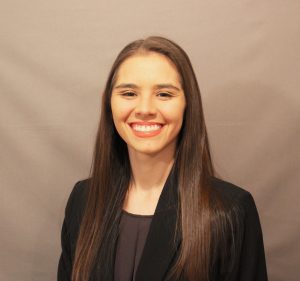JACKSON, Miss. – Samantha Cohen-Winans, a doctoral student in health and kinesiology at the University of Mississippi, has been selected as a member of the inaugural cohort of the Robert Smith, M.D. Graduate Scholars Program as part of the Jackson Heart Study’s new Graduate Training and Education Center at the UM Medical Center in Jackson.
Cohen-Winans, a Fort Worth, Texas, native who lives in Oxford, will join seven other graduate students to embark on the research opportunity beginning with a summer institute scheduled for June 24-28.
Part of the broader National Institutes of Health-funded Jackson Heart Study, the largest community-based study of cardiovascular disease risk factors in African-Americans, UMMC-GTEC is a two-year research training program. Designed for doctoral and health professional students who are considering careers in cardiovascular health sciences, the program allows students to participate in the research process – from idea generation to publication – alongside mentors from leading research institutions.
Dr. Bettina Beech, founding dean and professor of population health science at the John D. Bower School of Population Health, is principal investigator and co-director of UMMC-GTEC.
“Our scholars are going to be able to work with and be mentored by some of the top biomedical researchers in the nation who will be committing time and energy over the next two years to introduce them to the wonderful world of research,” Beech said. “They will learn more about health disparities research, not just that the fact that health disparities exist.”
Applicants for the program must be doctoral and health professional students at UM, Jackson State University, Mississippi State University or University of Southern Mississippi. They must be an individual from a group identified by the National Institutes of Health as underrepresented in the biomedical, clinical, behavioral and social sciences, and they must also be a U.S. citizen or permanent resident.
“We know from research studies that early introduction of intense research training and mentoring makes a difference in terms of trajectory of people that choose a career in research,” Beech said. “NHLBI is making a concerted investment – in fact, it’s one of the goals of their strategic plan – to increase the number of researchers from underrepresented groups.”
Those groups comprise a broad array of individuals, including “those from rural communities, racial and ethnic minorities and those with physical disabilities,” Beech said. Increasing diversity in the health professional workforce introduces a new understanding and sensitivity to communities that have traditionally been marginalized and continue to suffer from low resources and increased health risks.
“This program has the potential to add important aspects of science rigor and community awareness to the scholars’ existing training,” said Dr. Keith Norris, professor of internal medicine at the Geffen School of Medicine at the University of California at Los Angeles and co-director of the program.
“It will immerse them in the rigors of the research process and encourage them to focus on how their training will prepare them to help the lives of fellow residents in Mississippi.”
Norris is a board-certified nephrologist and hypertension specialist with a distinguished record of translational and health disparities research focusing on renal and cardiovascular health of African-Americans.
The two-year program will provide an intense research and training experience. Scholars commit to attending a five-day summer training institute both summers, one midyear meeting and quarterly webinars, as well as traveling to a Jackson Heart Study Vanguard Center at Johns Hopkins University.
One of the benefits is that scholars will have regular interaction with senior researchers and mentors throughout the program. Mentors will help the scholars learn how to write peer-reviewed manuscripts, conduct analyses and make scientific presentations.
The 2019 cohort of the Robert Smith, M.D. Graduate Scholars Program also includes: Robert Booker, a doctoral student in kinesiology at Mississippi State University; Raymond Jones, doctoral student in kinesiology and exercise physiology at the University of Southern Mississippi; Kisa Harris, a doctoral student in biostatistics and data science at UMMC; and Victoria Gholar, Leslie Musshafen, Fei “Fiona” Teng and Rachel Tyrone, doctoral students in population health science at UMMC.
A native of Terry, Dr. Robert Smith is one of Mississippi’s heroes of health care. He is nationally respected for his leadership as the founder of the Medical Committee for Human Rights. As part of the civil rights movement of the 1960s, this organization successfully pressured health care institutions across the South to expand access to health services for and end unequal treatment of African-Americans.
Smith founded Mississippi Family Health Center in 1963 and remains a practicing physician.
“The most important thing for the public to know about this program is that it is designed to bring health equity to Mississippi,” Norris said. “It is designed to increase the number of health research scholars in Mississippi who understand the needs of the residents in Mississippi and use their skills to improve health outcomes for all persons.”
